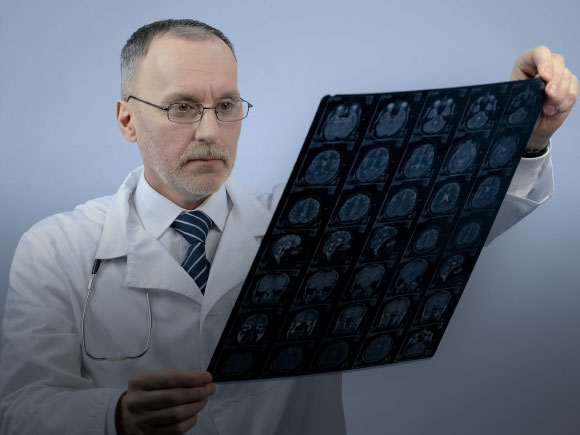A violent or sudden blow to the head that causes structural injury or physiological disruption of the brain is known as ‘Traumatic Brain Injury.’ The International Classification of Disease version 10 (ICD-10) is used for the identification of brain injuries. The ICD-10 codes for head injury through codes S00-S09 exclude birth-related injuries. All ICD10 codes for traumatic brain injury (TBI) are further classified into various categories, such as mild, moderate, severe, penetrating, and unclassifiable injuries.
Diagnosis
The ICD-10 codes give the specificity of initial, subsequent, and sequela to describe the head injury. Most injury diagnosis codes have a 7th character (letter). It specifies whether the diagnosis is the initial medical encounter (A), a subsequent encounter (D), or a sequela (S).
As traumatic brain injuries are usually emergencies and hence immediate medical attention is required. Diagnosis involves the following tests.
1. Computerized Tomography (CT scan): To determine the extent of the injury and assess the risk of developing complications, a CT scan is needed. It offers a detailed image of the brain with the help of X-rays. This scan can quickly visualize swelling, bleeding, fractures, blood clots, and contusions.
2. Magnetic Resonance Imaging (MRI): With strong radio waves and magnets, a detailed view of the brain is obtained. MRI is done once the patient’s condition stabilizes, or in those cases where symptoms do not improve after the traumatic brain injury.
3. Intracranial Pressure Monitor: Traumatic brain injury can lead to tissue swelling and increase pressure in the skull. This can cause additional brain damage. So, a probe is inserted through the skull to measure and monitor the pressure.
4. Glasgow Coma Scale (GCS): It is a 15-point test that assesses the initial severity of a brain injury. In this, the patient’s ability to follow directions, physical movements of limbs and eyes are checked. The coherence of speech offers more clues.
In the Glasgow Coma Scale, abilities are scored from three to 15. The higher the score means less severe the injuries. For children under five years of age, the GCS version differs slightly. As per the GCS score, traumatic brain injuries are classified as following.
- Minor: with a score of 13 or higher.
- Moderate: with a score of 9 to 12.
- Severe: with a score of 8 or lower
A score of 15 means the patient can speak and move when asked to, while a patient with a score of 3, the patient will be unconscious or in a coma.
Symptoms
Depending on the severity of the injury, symptoms vary. Some common Traumatic Brain Injury ICD 10 symptoms include the following.
Headache, vomiting, confusion, concussion or loss of consciousness, dilated pupils, blurred vision, dizziness, leakage of cerebrospinal fluid from nose and ears, changes in hearing, or ringing in the ears, breathing, and cognitive difficulties. In severe cases, the patient may slip into a coma or suffer paralysis.
Treatment
Treatment for traumatic brain injury ICD 10 is based on the severity and/or location of the injury. If you suspect any kind of brain injury, regardless of severity, you should seek the help of a qualified medical professional.
Mild injury: In mild injury cases, treatment is not needed. However, the patient is monitored closely for the development or worsening of any symptom.
Moderate And Severe Traumatic Brain Injury: The initial treatment mainly focuses on maintaining blood pressure, oxygen supply and stabilizing the patient. Medications are used to limit further damage to the brain. Medications include the following.
1. Over-the-counter-drugs: In case of mild injury, over-the-counter painkillers are used for headaches.
2. Diuretics: Diuretics are used to decrease the amount of fluid in tissues and to increase urine output. It also aids in reducing the pressure in the brain.
3. Anti-consultants: These drugs are given to those patients who are at risk of having seizures and to avoid brain damage due to seizure.
4. Anticoagulants: They are used to prevent blood clots.
5. Antidepressants: Antidepressants are used to treat symptoms of depression and mood instability.
6. Muscle relaxants: To reduce muscle spasms, muscle relaxants are given.
7. Coma-inducing drugs: In some cases, doctors have to induce temporary comas if there is damage to blood vessels supplying oxygen and nutrients to brain cells.
8. Surgery: In moderate to severe traumatic brain injury, to decrease additional brain tissue damage, surgery may be needed. Surgery is carried out to remove hematomas, stop bleeding inside the brain, or repair fractures in the skull. Also, to relieve the pressure in the skull and to drain accumulated spinal fluid, surgery may be carried out.
Usually, patients with moderate to severe traumatic brain injury need rehabilitation therapies. It includes various kinds of therapies like emotional, occupational, physical, and cognitive


